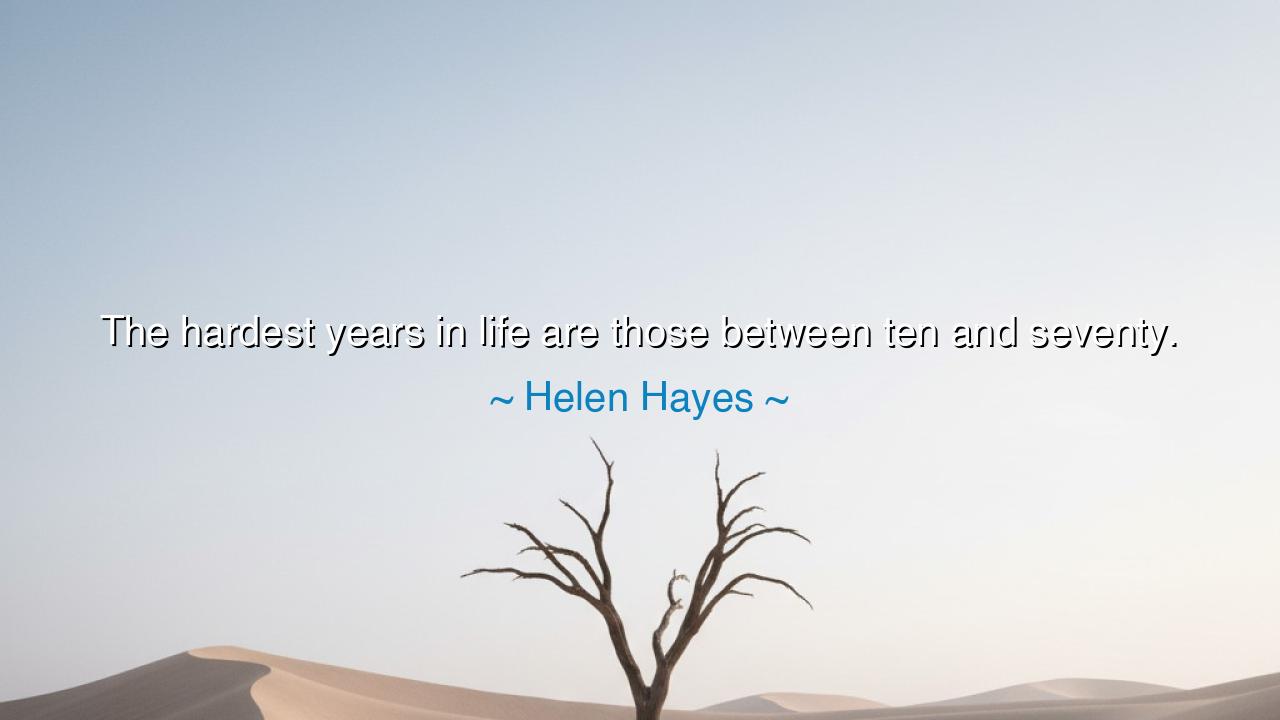
The hardest years in life are those between ten and seventy.






“The hardest years in life are those between ten and seventy.” – Helen Hayes
In this wry yet deeply profound reflection, Helen Hayes, the “First Lady of American Theatre,” reveals the truth of the human condition through the lens of humor and hard-won wisdom. On the surface, her words may bring a smile—for they seem to jest that life is difficult from childhood almost until death. Yet beneath the laughter lies a rich current of truth. What she calls “the hardest years” are those in which the human being must wrestle with growth, responsibility, ambition, loss, and meaning. From the age of ten, when innocence begins to fade, until seventy, when the burden of years begins to lift, we live in the constant tension between striving and surrender. Hayes’s quote, though simple, captures the long, heroic labor of being alive.
The origin of this insight comes from a woman who had walked through nearly every season of life’s stage. Born in 1900, Helen Hayes spent her youth under the spotlight, and her adulthood under the shadow of grief—losing her beloved daughter, husband, and many friends across the years. Yet she endured, performing with grace well into her later life. By the time she uttered these words, she spoke not as a cynic but as a survivor—one who had known both applause and silence, both triumph and sorrow. Her statement is not despairing; it is compassionate. She speaks as one who knows that the journey between youth and old age is a long and beautiful battle, and that to endure it is itself a kind of victory.
The years between ten and seventy are those of awakening and striving. At ten, the child begins to see the world not as a dream, but as a demanding teacher. At twenty, one burns with ambition, but also with uncertainty. At thirty and forty, one bears the weight of duty—family, career, reputation. At fifty, one begins to look back and question whether the climb was worth it. And at sixty, the body begins to whisper its limits, even as the spirit clings to unfinished dreams. Only after seventy, Hayes suggests, does the great struggle ease; one begins to accept life, not as a problem to be solved, but as a mystery to be embraced. Until then, the heart is busy—learning, fighting, loving, losing, and forever beginning again.
History gives us countless examples of this struggle. Consider Winston Churchill, whose life was marked not by comfort, but by constant challenge. As a boy, he was shy and lonely; as a young man, he faced political scorn; as a leader, he bore the crushing weight of war. He achieved greatness, but it was forged through decades of doubt, sleepless nights, and relentless effort. He did not rest until his twilight years, when, finally, the battle was behind him. His story, like Hayes’s words, reminds us that to live fully is to live in conflict with time, with fate, and with ourselves.
Hayes’s quote also carries an echo of ancient wisdom. The philosophers of Greece and the sages of the East all spoke of the middle years as the hardest—those when one is torn between desire and wisdom, between longing for youth and preparing for mortality. The Stoics said that the art of life lies in learning to accept what we cannot control. Yet for most, this lesson takes nearly a lifetime to master. Thus, the span from ten to seventy is not merely long—it is the crucible in which the human soul is shaped. Only after enduring its fires does one find the peace that age and acceptance can bring.
To struggle through life’s hardest years is not a curse but a sacred calling. For it is in these decades that we love, create, build, and give. The pain we feel in these years is the sign of our growth—the stretching of the heart as it learns compassion, the testing of the will as it learns endurance. Life’s difficulty is not proof of its cruelty, but of its depth. As Helen Hayes herself knew, the work of living is the work of becoming, and it is that work—continuous, unfinished, and humbling—that gives our days meaning.
So, my child of the passing hour, take this teaching to heart: do not curse the hardness of the years between ten and seventy. They are the proving ground of your soul. Embrace their trials as the training of your spirit. Know that fatigue, doubt, and disappointment are companions of all who walk the noble path of living. Do your work, love your people, endure your storms. And when you finally reach the later years—when you have made your peace with life and it with you—you will look back with quiet laughter and understand what Hayes meant: that the hardest years were also the most beautiful, for they were the years in which you truly lived.






AAdministratorAdministrator
Welcome, honored guests. Please leave a comment, we will respond soon